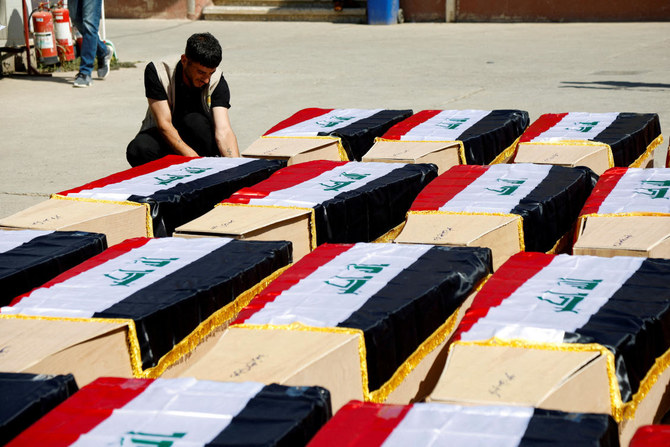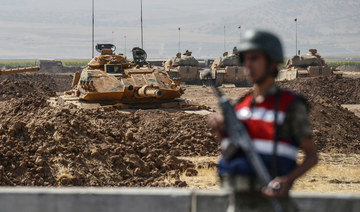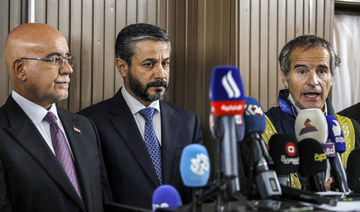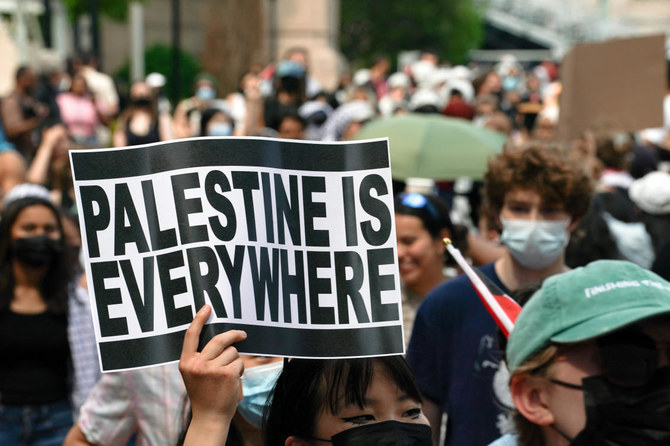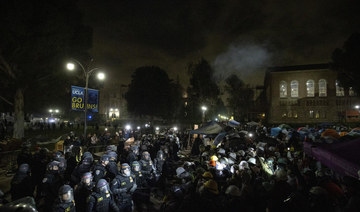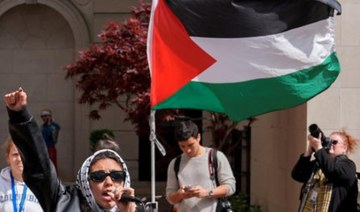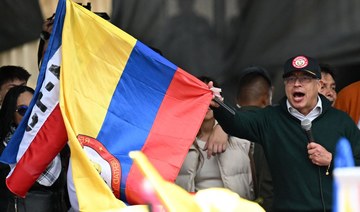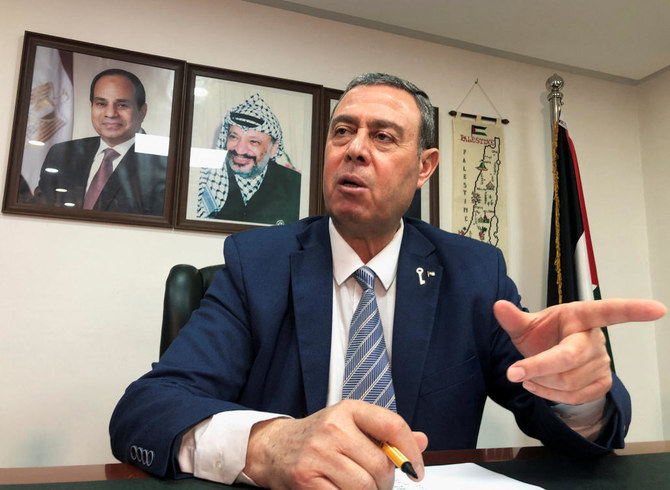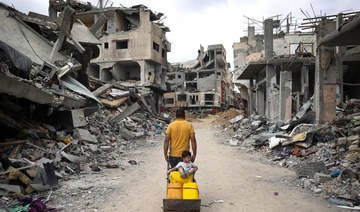BAGHDAD: A United Nations mission set up to help Iraq investigate alleged Daesh genocide and war crimes is being forced to shut prematurely before it can finish its probes, following a souring of its relationship with the Iraqi government.
The removal of the UN mission set up in 2017 comes nearly a decade after the extremist group rampaged across Syria and Iraq and at a time when many of Daesh’s victims still live displaced in camps and long for justice.
“Is the work done? Not yet, this is pretty clear,” Christian Ritscher, head of the UN Investigative Team to Promote Accountability for Crimes Committed by Daesh (UNITAD), told Reuters in an interview.
“We need more time... If you look at an end-date of September 2024, we will not achieve a completion of all investigative lines,” nor other projects such as creating a central archive for millions of pieces of evidence, he said.
Ritscher was speaking at length about the closure for the first time since the UN Security Council in September renewed the agency’s mandate for only one final year at Iraq’s request.
UNITAD’s international backers and donors had expected its work would continue for several more years.
Critics of Iraq’s decision to end the mission say it will hamper efforts to hold more members of Daesh accountable after UNITAD contributed to at least three convictions on charges of genocide and other international crimes in Germany and Portugal.
They also say it casts doubt on Iraq’s commitment to holding Daesh members accountable for such crimes at home, at a time when the vast majority of convictions in Iraq are made for simple membership of a terrorist organization, rather than specific crimes such as sexual abuse or slavery.
From Iraq’s perspective, UNITAD was no longer needed and had not successfully cooperated with Iraqi authorities, Farhad Alaaldin, foreign affairs adviser to the prime minister, told Reuters.
“In our view, the mission has ended and we appreciate the work that has been done and it’s time to move on,” he said, noting the mission “didn’t respond to repeated requests for sharing evidence” and must now do so before it ends.
’Highly political’
But that transfer of information appears uncertain.
UNITAD was set up to help Iraq hold Daesh members accountable for international crimes — genocide, war crimes and crimes against humanity — but Iraq has not passed legislation for that to happen in-country, leaving UNITAD “in a waiting position,” Ritscher said.
Additionally, UNITAD was reluctant to share evidence it gathered with Iraqi authorities because of Iraq’s use of the death penalty, which goes against UN policy, according to six people familiar with the mission’s work.
These factors put UNITAD in the awkward position of gathering evidence, including hundreds of witness testimonies, in Iraq but mainly using that evidence in legal processes abroad, in a mismatch that festered for years.
Reuters spoke to nine diplomats and international officials and four Iraqi sources to piece together this account of how UNITAD’s mission came to be curbed and the consequences it may have for accountability efforts.
Apart from the baked-in mismatch between the mission’s goals and Iraq’s expectations, six people said that under Ritscher, a seasoned German prosecutor, UNITAD had not properly invested in the politics of dealing with Iraqi authorities, harming the relationship.
“Death penalty was always a main issue with UNITAD. It’s mandate was far-fetched but many hoped it could work,” a senior international diplomat said, referring to the incompatibility between goals and expectations.
“Added to that, the current leadership did not have the political skills to reach out. That doesn’t work here in Iraq. Everything is highly political here.”
In response to that comment, a UNITAD spokesperson said the mission had absolute clarity from the beginning that it existed under the request of Iraq, and was always convinced the Iraqi judiciary was its main partner.
The spokesperson noted UNITAD’s production of joint case files with the Iraqi judiciary for trials abroad, as well as capacity-building for judges and cooperation on the exhumation of 70 mass graves and dignified burials for Daesh victims.
Lost hope
For many Daesh victims who distrust Iraq’s government and saw UNITAD’s presence as a reassuring sign of the international community’s support, the end of the mission has come as a blow.
These include members of Iraq’s Yazidi community, a religious minority Daesh saw as devil worshippers and subjected to mass killings, sexual violence and enslavement.
“Its very hard to see them leave us like this in the middle of the road,” said Zina, a Yazidi enslaved by Daesh at the age of 16 and held in captivity for three years.
She spoke via phone from a displacement camp near her native Sinjar in northwestern Iraq to which she cannot return amid concerns over security and lack of government compensation.
She asked Reuters to withhold her full name due to the sensitivity of what was discussed.
Zina said she was physically and sexually abused in captivity and true justice would require the family that enslaved her be tried for those crimes, rather than convicted of simple membership of a terrorist group.
“We wanted UNITAD to give us the chance to achieve even a little bit of justice in Iraq but, as I see it, the world failed us,” she said, referring to UNITAD’s impending closure.
Alaaldin said the government respected the critical views of citizens and was more supportive of Iraq’s minority communities than previous administrations.
Ritscher said he understood victims’ concerns but “I do not share the very negative assumptions about Iraq’s judiciary.”
With the mission set to end by mid-September, a burning question currently under negotiation between Iraq and the world body is what happens to the mass of evidence UNITAD gathered.
On the one hand, some diplomats, activists and victims are concerned it could be misused by Iraq, including in trials with little due process that might result in death sentences. On the other, much of the evidence could be critical to holding Daesh members accountable for specific international crimes.
“What we aimed to achieve is a proper completion. We want to ensure that this work is not lost or will simply go into a dead archive somewhere in the basement of a UN building,” Ritscher said, though there is not yet clarity on the matter.
Razaw Salihy, Iraq researcher at Amnesty International, noted flaws in the Iraqi justice system “that have landed thousands of men and boys on death row via confessions extracted under torture, duress and other kinds of ill treatment.”
Iraq denies obtaining confessions through coercion.
She said Iraq should reform its judiciary and pass a law on international crimes but noted political will might be lacking among a ruling coalition that includes armed groups.
“It could be a Pandora’s box. A working mechanism to hold members of IS accountable could also very easily be used to hold members of Iraqi security forces and armed groups accountable,” she said.



